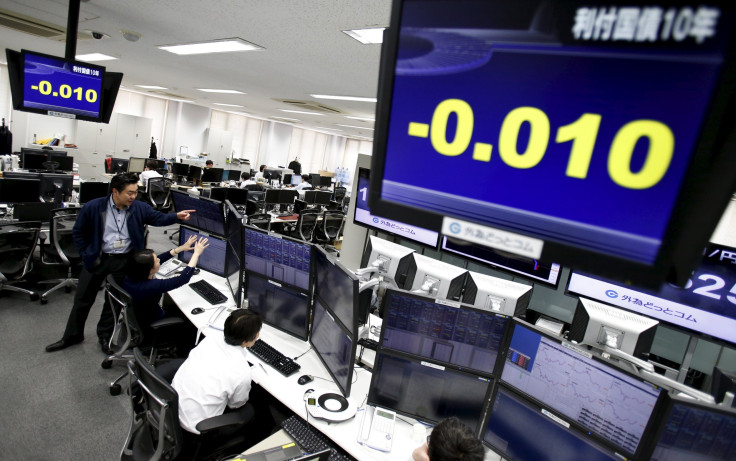Sovereign Bond Yields Plunge As Panic-Fueled Rout Grips Global Stock Markets

Persistent concerns over the state of the Chinese economy and uncertainties over the pace of the U.S. Federal Reserve’s monetary policy tightening measures sent investors across the world scrambling toward safe-haven assets Tuesday.
A widespread sell-off in global stock markets was accompanied by a concomitant surge in prices of sovereign bonds, causing — for the first time ever — the yields on longer-term Japanese bonds to fall below zero. The price of sovereign bonds — global safe assets — moves inversely to yields.
On Tuesday, following the Bank of Japan’s surprise Jan. 29 decision to charge some financial institutions for excess reserves held at the central bank, the yield on the 10-year Japan government bond dropped as low as -0.011 percent. So far this year, the yield has fallen by over 84 percent.
Meanwhile, a stock market rout overnight saw the Nikkei 225 Index drop 5.4 percent.
“It’s almost like a panic,” Hideo Shimomura, chief fund investor at Mitsubishi UFJ Kokusai Asset Management in Tokyo, told Bloomberg. “The flight to quality is exaggerated.”
In the U.S., the yield on the five-year Treasury also fell to around 1.1112 percent in Asia trading hours, its lowest level since June 2013, while the 10-year Treasury yield fell as low as 1.7396 percent — the lowest level in a year — on Tuesday.
Investors will closely watch the U.S. Federal Reserve Chairwoman Janet Yellen’s testimony before Congress Wednesday and Thursday for signs that the Fed may back off previously expected plans to continue raising interest rates this year. If the Fed keeps the rates low, it may be taken as an indication that a bright economic outlook — which led the central bank to increase rates for the first time in nine years in December — has since darkened.
“Sentiment towards risk assets remained extremely bearish and price action reflected a market that may be capitulating,” Jo Masters, a senior economist at ANZ, told Reuters. “[Yellen] needs to come across as optimistic without being too hawkish and cautious without being negative. Hawkishness or dovishness could easily exacerbate the current sell-off, tightening financial conditions further.”
© Copyright IBTimes 2025. All rights reserved.






















